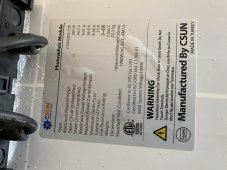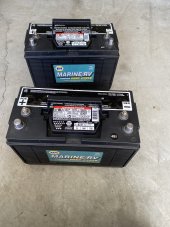I am putting together a basic system for a Sprinter van conversion. I recently obtained two used 305w solar panels and two like-new 100ah deep cycle lead batteries.
For now, I am looking to use both batteries and probably one panel mounted to the top of the van, but want the option of adding the second panel either permanent on the roof at some point or just carry it along and plug into the system when parked. So, things would have to work off one or two panels. Also, I intend on upgrading to lifepo4 in the future and I will build my own batteries from cells. However, I have a trip planned soon and would not be able to get the cells, and build the battery in time, so I got the gently used deep cycle marine/RV wet lead batteries as a temporary solution. I will be running a regular 110v mini fridge, and maybe a microwave or coffee maker for 10-15 minutes a day. Not too heavy a load.
From what I have read, I should get an MPPT controller and a pure sine wave inverter. I have no clue about what kind of BMS to get. However, these components would need to be able to run off one or two solar panels, handle wet lead acid (200ah total) or lifepo4 (intend on doing 280ah), and be able to run some basic 110v appliances.
What brand and size of controller should I get? I am looking for reliable but not necessarily top of the line. I know Victron is very good but also expensive. I am under the impression that EPEVER is a decent brand maybe? Any thoughts on other brands? Renogy?
Same questions on brand and size for BMS and inverter. I am thinking 1000-1500w inverter should do it. I am clueless on the BMS to use.
Thanks
Nik
For now, I am looking to use both batteries and probably one panel mounted to the top of the van, but want the option of adding the second panel either permanent on the roof at some point or just carry it along and plug into the system when parked. So, things would have to work off one or two panels. Also, I intend on upgrading to lifepo4 in the future and I will build my own batteries from cells. However, I have a trip planned soon and would not be able to get the cells, and build the battery in time, so I got the gently used deep cycle marine/RV wet lead batteries as a temporary solution. I will be running a regular 110v mini fridge, and maybe a microwave or coffee maker for 10-15 minutes a day. Not too heavy a load.
From what I have read, I should get an MPPT controller and a pure sine wave inverter. I have no clue about what kind of BMS to get. However, these components would need to be able to run off one or two solar panels, handle wet lead acid (200ah total) or lifepo4 (intend on doing 280ah), and be able to run some basic 110v appliances.
What brand and size of controller should I get? I am looking for reliable but not necessarily top of the line. I know Victron is very good but also expensive. I am under the impression that EPEVER is a decent brand maybe? Any thoughts on other brands? Renogy?
Same questions on brand and size for BMS and inverter. I am thinking 1000-1500w inverter should do it. I am clueless on the BMS to use.
Thanks
Nik




